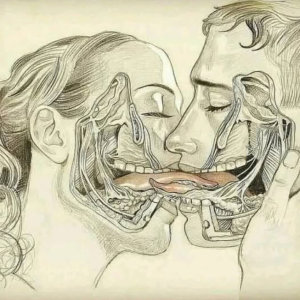When your partner starts kissing you more often with their tongue—commonly known as French kissing—it’s not just a shift in technique. It’s a signal, a language of intimacy that speaks volumes about emotional depth, physical desire, and the evolving dynamics of your relationship. Let’s unpack what this change might mean, layer by layer, in a way that goes far beyond the surface.
💋 The Language of the Tongue Kiss
French kissing isn’t just about physical contact—it’s a form of emotional communication. A quick peck might say “I care,” but a kiss with tongue often whispers “I crave you,” “I trust you,” or even “I want to explore more of us.” It’s messy, vulnerable, and deeply personal.
🔥 1. Rising Passion and Desire
One of the most obvious interpretations of increased tongue kissing is heightened sexual attraction. Tongue kisses are often spontaneous, intense, and full of energy. They’re not just affectionate—they’re primal. If your partner is initiating more of these, it could mean they’re feeling a surge of desire for you.
- Why it matters: Passion is a vital ingredient in romantic relationships. It keeps things exciting and reminds both partners of their physical chemistry.
- What to notice: Are these kisses happening in private moments or public ones? Are they accompanied by other signs of arousal or flirtation?
🤝 2. Growing Emotional Closeness
Tongue kissing requires vulnerability. It’s not just about technique—it’s about letting go of inhibitions. When your partner kisses you this way more often, they may be expressing a deeper emotional connection. It’s a way of saying, “I feel safe with you,” or “I want to be closer than ever”.
- Emotional intimacy: These kisses can be a sign that your partner is opening up emotionally, not just physically.
- Trust signals: The comfort to engage in such intimate gestures often reflects a foundation of trust and security.
🧠 3. Emotional Intelligence in Action
A tongue kiss isn’t just about movement—it’s about rhythm, responsiveness, and mutual energy. If your partner mirrors your pace, adjusts to your style, and seems attuned to your reactions, that’s emotional intelligence at play.
- Empathy through kissing: Matching your rhythm shows they’re tuned into your emotional state.
- Connection cues: These moments can feel like a duet—two people in sync, expressing affection without words.
🎭 4. Personality Reflections
Believe it or not, the way someone kisses can reveal aspects of their personality. A confident, assertive kiss might reflect a bold, take-charge nature. A slow, tender kiss might show romanticism and thoughtfulness. Playful kisses? That’s someone who loves fun and spontaneity.
- Kissing styles as personality mirrors: Observe how your partner’s kissing style aligns with their behavior in other areas of life.
- Adaptability: If they change their style based on your mood or setting, it shows attentiveness and flexibility.
🧪 5. Exploration and Curiosity
Sometimes, increased tongue kissing is a sign your partner wants to spice things up. It’s their way of saying, “Let’s keep discovering each other.” This can be especially true in long-term relationships where routine can dull the spark.
- Keeping things fresh: Trying new kissing styles or intensifying physical affection can reignite excitement.
- Playful experimentation: It’s a way to explore boundaries, preferences, and deepen physical intimacy.
🛋️ 6. Comfort and Security
Not all tongue kisses are fiery. Some are soft, slow, and deeply comforting. These kisses can mean your partner feels safe enough to be fully themselves with you. It’s a form of emotional exhale—a moment where they let go and simply exist with you.
- Safe space signals: These kisses often happen during quiet moments, like cuddling or winding down after a long day.
- Emotional grounding: They can be a way to reconnect, soothe, and affirm the bond.
🧬 7. Chemistry and Biology
There’s a scientific side to this too. French kissing activates pleasure centers in the brain, increases heart rate, and releases oxytocin—the “love hormone” that fosters bonding and trust. It’s not just emotional—it’s chemical.
- Oxytocin release: This hormone strengthens emotional attachment and comfort.
- Immune system boost: Believe it or not, exchanging saliva can expose you to your partner’s microbiome, subtly boosting immunity.
🕰️ 8. Reaffirming Long-Term Love
In long-term relationships, tongue kissing can be a quiet way of saying, “We still have this.” It’s not always about seduction—it can be about reassurance. A soft, meaningful kiss during daily life can do more for intimacy than grand romantic gestures.
- Daily intimacy: These kisses can be woven into routines—before work, during dinner, or while watching TV.
- Emotional maintenance: They help maintain the emotional glue that holds relationships together.
🧼 9. Hygiene and Respect
Let’s not forget the practical side. Increased tongue kissing also implies a level of mutual respect and hygiene. Fresh breath, clean teeth, and attentiveness to physical comfort are all part of the equation.
- Respecting boundaries: Good kissing involves consent, mutual desire, and attentiveness.
- Physical care: It shows your partner values the experience and wants it to be enjoyable for both of you.
🧭 Final Thoughts: What Should You Do With This Info?
If your partner is kissing you more often with their tongue, consider it a beautiful opportunity to reflect on your relationship. Are you feeling closer emotionally? Is the physical spark reigniting? Are you both exploring new ways to connect?
Here’s how to respond:
- Tune in: Pay attention to the emotional tone of the kiss. Is it playful, passionate, comforting?
- Reciprocate: Match their energy and style. Let the kiss become a shared experience.
- Communicate: If you’re unsure what it means, ask. Sometimes the best way to understand is to talk about it.
- Celebrate: Whether it’s a sign of passion, comfort, or curiosity—embrace it. It’s a sign your relationship is alive and evolving.
French kissing isn’t just about lips and tongues—it’s about trust, desire, and emotional resonance. So next time your partner leans in with a little more tongue, know that it might be saying more than words ever could.


